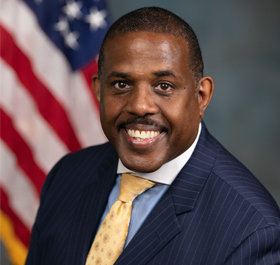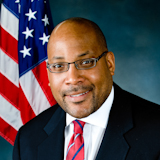S T A T E O F N E W Y O R K
________________________________________________________________________
4293
2009-2010 Regular Sessions
I N S E N A T E
April 21, 2009
___________
Introduced by Sen. PARKER -- read twice and ordered printed, and when
printed to be committed to the Committee on Commerce, Economic Devel-
opment and Small Business
AN ACT creating a sustainable development task force to study the feasi-
bility of adopting goal oriented and performance based regulatory
systems to achieve a goal of sustainable development for the state of
New York
THE PEOPLE OF THE STATE OF NEW YORK, REPRESENTED IN SENATE AND ASSEM-
BLY, DO ENACT AS FOLLOWS:
Section 1. As used in this act, the term:
(1) "Benchmarks" means interim indicators that measure the progress in
achieving measurable objectives and long term measurable goals.
(2) "Long term measurable goals" means the attainment of the condition
for a parameter that is necessary to achieve sustainable development
within 25 years.
(3) "Measurable objectives" means measurable achievements at specific
points in time, typically in two- to five-year segments that over the
duration achieve long term measurable goals.
(4) "Sustainable development" means managing the use, development and
protection of natural and physical resources in a way, or at a rate,
that enables people to meet their current needs without compromising the
ability of future generations to meet their own needs.
S 2. The legislature finds and declares that:
(1) In order to establish a policy of sustainable development neces-
sary for economic competitiveness in the twenty-first century, the state
must achieve the following intermediate value goals:
(a) A competitive and balanced economy;
(b) A healthy environment;
(c) A continuing resource base; and
(d) Communities that provide a good quality of life, for both current
and future generations of New Yorkers.
EXPLANATION--Matter in ITALICS (underscored) is new; matter in brackets
[ ] is old law to be omitted.
LBD01774-01-9
S. 4293 2
(2) Although New York state has made progress towards the goals set
forth in subdivision one of this section, it lacks an integrated strate-
gy for achieving these goals concurrently. It also lacks established
mechanisms for measuring the success of activities implemented to
achieve these goals.
(3) To develop an integrated strategy for achieving the four goals set
forth in subdivision one of this section, and thus establishing a
sustainable development policy, the state must:
(a) Examine the feasibility of establishing clear, long term measur-
able goals for environmental and natural resource stewardship along with
measurable objectives and interim benchmarks to monitor progress towards
the goals;
(b) Examine a performance based system in which long term measurable
goals can be attained by carefully monitored and self-generated, incen-
tive based strategies that improve the efficiency and effectiveness of
environmental management and regulation for businesses, communities and
government; and
(c) Integrate environmental and natural resource goals with economic
and societal goals.
S 3. In order to achieve the goals set forth in subdivision one of
section two of this act, the state shall examine an environmental and
natural resource management system that is based on a policy of sustain-
able development and that:
(1) Establishes clear long term measurable goals and measurable objec-
tives;
(2) Is incentive based and performance oriented;
(3) Allows attainment of superior environmental and natural resource
management performance by adoption of a performance track in which enti-
ties would be held accountable for achieving long term measurable goals
but have freedom to choose how to accomplish them;
(4) Assures predictability for participants;
(5) Is integrated, cross media, cross agency and flexible;
(6) Focuses on managing the causes of environmental degradation rather
than simply impacts;
(7) Concentrates on issues of long term ecological significance; and
(8) Achieves the objectives of subdivisions one, two, three, four,
five, six and seven of this section in the most cost-effective, econom-
ically accommodating and community oriented manner.
S 4. (1) A sustainable development task force is hereby created to
conduct the examination described in section three of this act and
determine the viability of adopting a goal oriented and performance
based regulatory system with sustainable development as the overarching
environmental policy for the state.
(2) The task force shall consist of fifteen members, each to serve for
a term of two years, to be appointed as follows: two shall be appointed
by the temporary president of the senate and one by the minority leader
of the senate; two shall be appointed by the speaker of the assembly and
one by the minority leader of the assembly; seven shall be appointed by
the governor. The appointees shall be broadly representative of the
geographic areas of the state and include representatives of industry,
public interest groups and local government and the public at large. No
more than four appointees shall be legislators. Commissioners of the
department of environmental conservation and the department of economic
development shall be ex-officio members. The governor shall designate
the chairman and vice chairman from among his appointees. Vacancies in
S. 4293 3
the membership of the commission and among its officers shall be filled
in the manner provided for original appointments.
(3) The task force may employ and at pleasure remove such personnel as
it may deem necessary for the performance of its functions and fix their
compensation within the amounts made available therefor.
(4) The task force may meet within and without the state, shall hold
public hearings, and shall have all the powers of a legislative commit-
tee pursuant to the legislative law.
(5) The members of the task force shall receive no compensation for
their services, but shall be allowed their actual and necessary expenses
incurred in the performance of their duties hereunder.
(6) To the maximum extent feasible, the task force shall be entitled
to request and receive and shall utilize and be provided with such
facilities, resources, and data of any court, department, division,
board, bureau, commission, or agency of the state or any political
subdivision thereof as it may reasonably request to carry out properly
its powers and duties hereunder.
S 5. In accordance with the requirements established by the sustaina-
ble development task force, the departments of environmental conserva-
tion, economic development, agriculture and markets, and parks, recre-
ation and historic preservation and any other agency or public benefit
corporation deemed appropriate by the task force shall determine the
following and report to the task force:
(1) The degree to which a state policy of sustainable development will
assist the agency in carrying out its mission.
(2) Methods for establishing long term measurable goals to achieve
sustainable development, including interim benchmarks from the agency's
perspective.
(3) How collaboration would occur with other governmental entities and
state agencies under a policy of sustainable development.
(4) Changes to statutes, rules, policies, intergovernmental agree-
ments, strategic plans, relationships with private and nonprofit sectors
and the agency's organization and processes that would be necessary to
implement a policy of sustainable development.
(5) Whether resources are being allocated in reasonable proportion to
the ecological significance of sustainable development and the resource
allocation changes necessary to bring the allocation into proper propor-
tion.
(6) The extent to which new systems can be developed, particularly
incentive based programs, to achieve measurable superior environmental
protection and natural resource management.
S 6. The appointing authorities shall appoint the members of the
sustainable development task force on or before 90 days after this act
shall have become a law and the task force shall convene its first meet-
ing on or before 60 days thereafter.
S 7. The task force shall make a preliminary report to the governor
and the legislature of its findings, conclusions, and recommendations by
the one hundred twentieth day after the act establishing the task force
shall take effect and a final report of its findings, conclusions, and
recommendations not later than one year after the act establishing the
task force shall take effect, and shall submit with its reports such
legislative proposals as it deems necessary to implement its recommenda-
tions.
S 8. This act shall take effect on the ninetieth day after it shall
have become a law.




